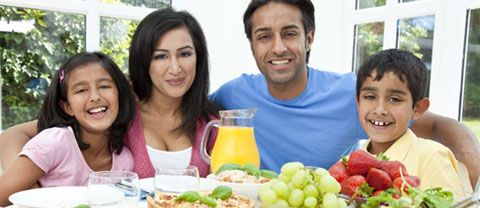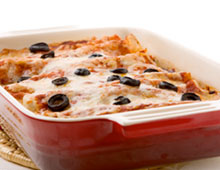Newsletter: September 2013
Back to the Dinner Table. Are you ready?

Yes, it is back to school for many, but for us at The Family Dinner Project, it’s just another excuse to talk about eating together! Every transition brings with it an opportunity to reinvest in the habits that make our families healthier and happier. School schedules bring with them their own set of challenges, so we want to talk about learning to make family dinner work for you. And that means meeting you wherever you are in the process. Some folks might just need a tune-up to get back into a dinner routine that got rusty over the summer. For others, the start of a new school year is the perfect opportunity to introduce family dinners for the first time. Either way, the following tips can serve as good reminders or get you started on the right track:
- Set manageable goals for yourself. Start with one family dinner per week. You’re going to eat anyway, right? Try to do it with everyone at the table (if that’s not possible, do breakfast or dessert instead!) If one night is too easy, then make it one more than your norm. And pick a conversation starter or two to get a good discussion going at the table.
- Keep cooking simple. Time is precious, we know, particularly when kids are back in school. Dinner doesn’t have to be fancy and exotic—and often there just isn’t time for that. All of our recipes are easy to make and require only 8 ingredients or fewer.
- Stock up. Make sure you always have some items on hand that together can add up to a quick meal. We polled some of our followers on social media to ask them what their must-have-on-hand items are and their responses included chick peas, beans (all types but black beans were a particular favorite), pasta, peanut butter, cheese and tuna fish. Here’s a list of more suggestions.
- Plan, plan and plan. Did we mention that it helps to plan? Whether it’s Saturday morning or Sunday night or anytime that works for your schedule. Try using our weekly planner to get you going. Thinking out your dinners for each week and taking into account everyone’s schedule ahead of time can make a huge difference in reducing stress around family dinner.
- Forget perfection. Be kind to yourself. We’re all transitioning this time of year. And always remember: The good-enough dinner is good enough.
These tips come from our do-it-yourself program, Food, Fun and Conversation: 4 Weeks to Better Family Dinners!
![]()
 Food
Food
What food goes best with this often stressful, back-to-school time of year? Comfort food, of course! This month’s featured recipe is our easy-cheesy enchiladas dish. It doesn’t get much simpler, delicious and comforting than this, we promise!
![]()
Fun
 “One of these things is not like the other, one of these things just doesn’t belong.”
“One of these things is not like the other, one of these things just doesn’t belong.”
This game is fun to play, even if you–or your kids–aren’t familiar with the old song that usually accompanies it (bonus points if you are!). Whoever goes first names three or four items. All but one of the items needs to be related in some way. The winner guesses which item does not belong with the rest of the list.
A few examples:
- “Doughnut, cookie, pretzel, ice cream” (Pretzel doesn’t belong because it’s salty, not sweet)
- “Orange, baseball, pear ” (Pear doesn’t belong because it’s not round OR baseball doesn’t belong because it’s not a fruit)
For an even easier variation of this game, check out the Guess the Category game!
![]()
Conversation
 As our children head back to school, they will meet people who are different from them – people with different backgrounds, traditions, experiences and beliefs. Approaching and talking to people who are different from us offers an incredible opportunity to expand our view of the world. Our conversation starters this month are all about dealing with difference – and exploring qualities such as being open-minded, adaptable and tolerant of others.
As our children head back to school, they will meet people who are different from them – people with different backgrounds, traditions, experiences and beliefs. Approaching and talking to people who are different from us offers an incredible opportunity to expand our view of the world. Our conversation starters this month are all about dealing with difference – and exploring qualities such as being open-minded, adaptable and tolerant of others.
2-7 Years Old:
- Have you met any new kids since you went back to school (or for younger kids, daycare or preschool)? What do you like about them? How are they different from you? How are they the same?
- Tell a story of eating over at a friend’s house. How was it different from eating dinner at your house?
- “A person’s a person no matter how small…” writes Dr. Suess in his classic book Horton Hears a Who. What do you think he means by that? (or if you own the book The Sneetches, read and discuss).
- What one thing do you do now that you need an adult for but would like to try to do all by yourself?
8-13 Years Old:
- What does it mean to be open-minded? How would you define it? Can you give an example of someone you know who you think is open-minded?
- Is there something that you do differently in your family (a tradition, for example) that you are really proud of? Anything that you feel uncomfortable sharing with others?
- “The Potter books in general are a prolonged argument for tolerance…,” said author J.K. Rowling. If you’ve read the Harry Potter books, how do you think they make an argument for tolerance? If you haven’t, talk about a book you’ve read or a movie you’ve seen that does make a successful argument for tolerance and acceptance of difference?
14-100 Years Old:
- In general, do you think we as a society are more or less tolerant toward one another than we used to be? Why or why not?
- Talk about a time when your adaptability or open-mindedness really helped you in a situation.
- “Don’t be in a hurry to condemn because he doesn’t do what you do or think as you think or as fast. There was a time when you didn’t know what you know today.” How might this quote by Malcolm X apply to your own life?
Recent Newsletters
- Family Dinner Has Gotten Expensive - April 2024
- Is it the Family, Or the Dinner? - March 2024
- Black History Month at Family Dinner - February 2024
- New Year, Same You - January 2024
- Sharing the Holiday Load - December 2023
- What’s Your Thanksgiving Story? - November 2023
- Family Dinner: Stressful, or Stress-Busting? - October 2023
- New Ways to Ask “How Was Your Day?” - September 2023
- Low Stress, Low Cost, Low Waste Dinner Hacks - August 2023
- Family Dinner After Divorce - July 2023
- Preparing Teens for Dinner Independence - June 2023
- Talking to Kids About Technology - May 2023
